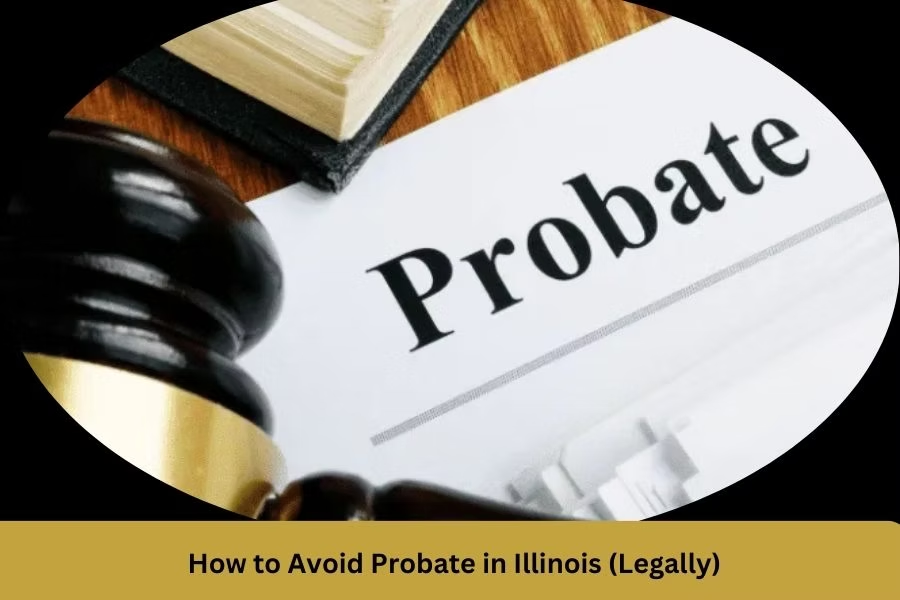Probate is a court-supervised legal process that occurs after someone passes away, designed to distribute their assets to heirs or beneficiaries, settle debts, and resolve any claims against the estate. In Illinois, probate can be time-consuming, costly, and emotionally draining for families, often taking months or even years to complete. Fortunately, with proper estate planning, it’s possible to legally avoid probate, ensuring a smoother and quicker transfer of assets. The Real Estate Law Firm specializes in guiding Illinois residents through these strategies, leveraging tools like trusts, deeds, and beneficiary designations to bypass the probate process. This article explores practical and legal methods to avoid probate in Illinois, helping you protect your legacy and ease the burden on your loved ones.
Learn how estate planning can help avoid probate.
Why Avoid Probate in Illinois?
Probate in Illinois is often necessary when a deceased person’s estate includes real estate or personal assets valued over $ 100,000 held solely in their name. The process involves filing the will (if one exists) with the county court, appointing an executor or administrator, notifying creditors, and distributing assets under court supervision. However, probate has several drawbacks:.
Time-Consuming: Probate can take 6 months to several years, delaying asset distribution.
Costly: Legal fees, court costs, and executor fees can erode the estate’s value, often ranging from $ 6,000 to $ 15,000 for an average estate.
Public Process: Probate is a public proceeding, meaning estate details, including asset values and beneficiaries, become part of the public record.
Emotional Strain: Families grieving a loss may find the bureaucratic process stressful.
By working with The Real Estate Law Firm, you can implement strategies to avoid these challenges, ensuring your assets pass directly to your intended beneficiaries with minimal delay and expense.
Legal Strategies to Avoid Probate in Illinois.
Here are the most effective methods to legally avoid probate in Illinois, each tailored to different types of assets and estate planning goals. Consulting with The Real Estate Law Firm ensures these strategies are executed correctly to align with Illinois law.
1. Create a Revocable Living Trust.
A revocable living trust is one of the most powerful tools for avoiding probate in Illinois. This legal entity allows you to transfer ownership of assets-such as real estate, bank accounts, vehicles, and investments-into the trust during your lifetime. As the grantor, you can serve as the trustee, retaining full control over the assets, and designate beneficiaries to receive them upon your death.
How It Works: Assets held in the trust are no longer part of your probate estate. Upon your death, the successor trustee you named distributes the assets to beneficiaries according to the trust’s terms, bypassing probate entirely.
Benefits: A living trust is flexible, private, and allows you to amend or revoke it during your lifetime. It’s particularly useful for complex estates or those with real estate.
Considerations: Setting up a trust requires legal expertise and initial costs, but The Real Estate Law Firm can streamline the process, ensuring all assets are properly titled to the trust to avoid probate.
For example, if you own a home in Chicago, transferring it to a revocable living trust via a deed prepared by The Real Estate Law Firm ensures the property passes to your heirs without probate court involvement.
2. Use a Transfer-on-Death Instrument (TODI) for Real Estate.
Illinois offers a unique tool called a Transfer-on-Death Instrument (TODI), also known as a transfer-on-death deed, specifically designed to avoid probate for real estate. A TODI allows you to name a beneficiary who will automatically inherit your property upon your death without probate.
How It Works: You record the TODI with the county recorder’s office during your lifetime, specifying the beneficiary. You retain full control of the property, including the ability to sell or revoke the TODI, until your death. Upon passing, the property transfers directly to the beneficiary.
Benefits: TODIs are simple, cost-effective, and ideal for residential properties. They avoid the delays and costs of probate while ensuring your real estate goes to your chosen heir.
Considerations: TODIs apply only to residential real estate in Illinois, and the deed must be properly recorded before your death. The Real Estate Law Firm can draft and record a TODI, ensuring compliance with Illinois requirements.
For instance, if you own a condo in Naperville, a TODI prepared by The Real Estate Law Firm can designate your child as the beneficiary, allowing them to inherit the property seamlessly.
3. Establish Joint Ownership with Right of Survivorship.
Joint ownership with right of survivorship is a straightforward way to avoid probate for assets like real estate, bank accounts, or vehicles. In Illinois, this can take the form of joint tenancy with right of survivorship or tenancy by the entirety (for married couples or civil unions).
How It Works: When one co-owner dies, the surviving owner automatically inherits the asset without probate. For example, a married couple owning a home as tenants by the entirety ensures the surviving spouse takes full ownership upon the other’s death.
Benefits: This method is simple and requires no additional legal documents beyond titling the asset correctly. It’s ideal for couples or co-owners who want to share ownership equally.
Considerations: Joint ownership means shared control during your lifetime, and adding a co-owner could have tax or creditor implications. The Real Estate Law Firm can review your situation to ensure joint ownership aligns with your goals.
4. Designate Beneficiaries on Accounts.
Many financial accounts, such as retirement accounts (e. G., IRAs, 401(k)s), life insurance policies, and bank accounts, allow you to name beneficiaries who inherit the assets directly upon your death, bypassing probate.
How It Works: By completing a beneficiary designation form with your financial institution, you specify who receives the account’s funds. For bank accounts, Illinois allows “payable-on-death” (POD) designations.
Benefits: This method is quick, cost-free, and ensures assets transfer immediately to beneficiaries. It’s ideal for liquid assets like savings or investment accounts.
Considerations: Ensure beneficiary designations are updated to reflect life changes, such as marriage or divorce. The Real Estate Law Firm can coordinate these designations with your broader estate plan.
5. Use a Small Estate Affidavit.
If an estate’s probate assets are valued at less than $ 100,000 and include no real estate, Illinois allows the use of a Small Estate Affidavit to avoid formal probate.
How It Works: Heirs or beneficiaries complete the affidavit, which certifies the estate’s value and lists the assets and rightful recipients. This document is presented to institutions holding the assets (e. G., banks) to transfer them directly.
Benefits: The affidavit is a low-cost, expedited process that avoids court involvement.
Considerations: It’s not suitable for estates with real estate or disputes among heirs. The Real Estate Law Firm can prepare a Small Estate Affidavit and guide you through its use.
6. Make Lifetime Gifts.
Gifting assets during your lifetime removes them from your probate estate, as they are no longer owned by you at the time of death.
How It Works: You can gift real estate, money, or other assets to family or loved ones. In 2025, the federal gift tax exclusion allows you to gift up to $ 18,000 per recipient without filing a gift tax return.
Benefits: Gifting reduces the size of your estate, potentially avoiding probate entirely if all assets are transferred before death.
Considerations: Gifting relinquishes control of the asset, and large gifts may have tax implications. The Real Estate Law Firm can advise on tax-efficient gifting strategies.
Why Choose The Real Estate Law Firm?
Navigating Illinois probate law requires expertise to ensure your estate plan is legally sound and tailored to your needs. The Real Estate Law Firm offers:.
Expertise in Real Estate: Specializing in tools like TODIs and trust deeds, we ensure your property transfers smoothly.
Comprehensive Planning: We coordinate trusts, beneficiary designations, and affidavits to create a cohesive plan.
Personalized Service: Our attorneys work closely with you to understand your goals and minimize costs.
Local Knowledge: With deep experience in Cook, DuPage, Kane, Lake, and Will counties, we handle Illinois-specific requirements with precision.
By partnering with The Real Estate Law Firm, you can avoid the pitfalls of probate, protect your assets, and provide peace of mind for your loved ones.
Meet the estate planning attorneys behind our success.
Additional Considerations.
While these strategies are effective, they require careful planning to avoid unintended consequences. For example, improperly titled assets may still trigger probate, and disputes among heirs can complicate non-probate transfers. Additionally, Illinois does not follow the Uniform Probate Code, making local expertise critical. The Real Estate Law Firm can review your estate, identify potential issues, and implement a plan that minimizes legal and tax risks.
Avoiding probate also shortens the creditor claim period. In probate, creditors have six months to file claims, but non-probate assets limit this to two years, which can be advantageous for estates with significant debts. Consulting with The Real Estate Law Firm ensures all aspects of your estate plan are optimized.
Conclusion.
Avoiding probate in Illinois is not only possible but also highly beneficial for saving time, reducing costs, and maintaining privacy. By using tools like revocable living trusts, TODIs, joint ownership, beneficiary designations, Small Estate Affidavits, and lifetime gifts, you can ensure your assets pass directly to your heirs.
The Real Estate Law Firm is your trusted partner in this process, offering expert guidance to create a tailored estate plan that meets your needs and complies with Illinois law. Contact The Real Estate Law Firm today at (630) 687-9100 or visit our website to schedule a free consultation and start protecting your legacy.
Let’s protect your legacy-start your plan today.
FAQs.
What is probate, and why should I avoid it in Illinois?
Probate is a court-supervised process to distribute a deceased person’s assets. In Illinois, it can be costly (often $ 6,000-$ 15,000), time-consuming (6 months to years), and public. Avoiding probate saves time, money, and stress, as The Real Estate Law Firm can help you achieve.
Can a will help me avoid probate in Illinois?
No, a will does not avoid probate; it guides the probate process. To bypass probate, use tools like trusts or TODIs, which The Real Estate Law Firm can prepare.
What is a Transfer-on-Death Instrument (TODI)?
A TODI is a deed that names a beneficiary to inherit your residential real estate upon your death, avoiding probate. The Real Estate Law Firm ensures proper drafting and recording.
How does a revocable living trust avoid probate?
Assets in a revocable living trust are owned by the trust, not you, so they pass to beneficiaries without probate. The Real Estate Law Firm can set up and fund your trust correctly.
Who can use a Small Estate Affidavit in Illinois?
Heirs can use a Small Estate Affidavit if the estate’s probate assets are under $ 100,000 and include no real estate. The Real Estate Law Firm can prepare this document for you.
Does joint ownership with right of survivorship avoid probate?
Yes, assets like real estate or bank accounts held in joint tenancy with right of survivorship pass directly to the surviving owner, bypassing probate. The Real Estate Law Firm can advise on proper titling.
Are there tax implications for gifting assets to avoid probate?
Gifts up to $ 18,000 per recipient in 2025 are tax-free under the federal gift tax exclusion. Larger gifts may require a tax return. The Real Estate Law Firm can guide you on tax-efficient gifting.
Can I avoid probate for out-of-state property?
Illinois strategies like trusts can avoid probate for Illinois assets, but out-of-state real estate may require ancillary probate unless titled in a trust. The Real Estate Law Firm can coordinate multi-state planning.
How long does it take to set up a probate-avoidance plan?
With The Real Estate Law Firm, simple tools like TODIs or beneficiary designations can be set up in days, while trusts may take a few weeks, depending on your estate’s complexity.
How do I get started with avoiding probate?
Contact The Real Estate Law Firm for a free consultation. We’ll assess your assets, discuss your goals, and create a customized plan to avoid probate legally and efficiently.




